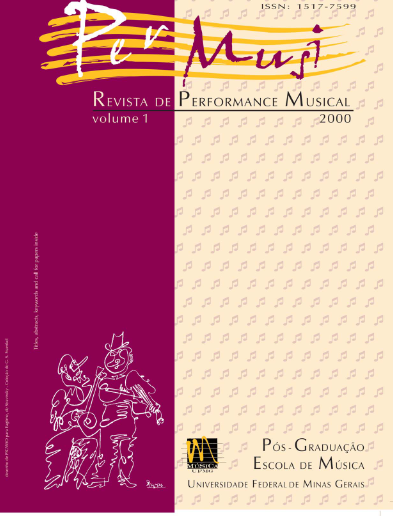O serialismo e o atonalismo livre aportam na MPB
as canções do LP Clara Crocodilo de Arrigo Barnabé
Palavras-chave:
Serialismo, Atonalismo, MPB, Música popular brasileira, Rock, Arrigo Barnabé, Clara CrocodiloResumo
Neste estudo, observa-se a relação da utilização dos processos seriais nas canções do LP Clara Crocodilo de Arrigo Barnabé com o conteúdo sociológico das letras, onde a marginália da cidade de São Paulo na década de 70 é retratada. Conclui-se também que os processos seriais são utilizados como afronta ao tonalismo, como uma conotação da distorção e da desintegração do centro tonal; paralelamente, no texto poético, o ser humano é retratado em sua forma distorcida e desintegrada.
Referências
ARANTES, José Tadeu. Arrigo: a música como um formoso crocodilo. Movimento, São Paulo, (300): 17-18, mar. 1981.
BARNABÉ, Arrigo. Clara crocodilo. LP 813.598-11. São Paulo: Nosso Estúdio, 1980.
CARVALHO, Ilmar. Arrigo Barnabé: profeta maldito da megalópole. Pasquim, Rio de Janeiro, 16(798): 8-9, out. 1984.
DIAS, José Américo. Arrigo Barnabé. Canja, São Paulo, 1(18): 9-11, fev. 1981; 1(19): 14-9, mar. 1981.
FALA, Arrigo! Pasquim, Rio de Janeiro, 14(711):8-10, fev. 1983.
FIORILLO, Marília Pacheco. Arrigo, o desbravador. Veja, São Paulo (644): 46-47, jan. 1981.
GRIFFITHS, Paul. A Música Moderna: Uma história concisa e ilustrada de Debussy a Boulez. Rio de Janeiro: Jorge Zahar Editor, 1987.
MEYER, Leonard. Music, the Arts and Ideas; patterns and predictions in Twentieth-Century culture. Chicago: The University of Chicago Press, 1967.
NAZÁRIO, Luiz. Da natureza dos monstros. São Paulo: ?, 1983, p.29-34.
PAIVA, Saviano. História Ilustrada dos Filmes Brasileiros; 1929-1988. Rio de Janeiro: Francisco Alves, 1989.
RAMOS, Luciano. Guia Completo de Filmes para TV e Vídeo. São Paulo: Nova Cultural, 1990.
RAUCHHAUPT, Ursula von. Die Streichquartette der Weiner Schule: Schoenberg, Berg, Webern. Eine Dokumentation. Munique: V. Ellerman, 1971.
SILVA, André Cavazotti e. “Processos seriais na obra de Arrigo Barnabé: As Oito Canções do LP Clara Crocodilo”, diss. de mestr., UFRGS, 1994.
SOUZA, Okky de. O filho da Tropicália. Veja, São Paulo (745): 3-6, dez. 1982.
WUORINEN, Charles. Simple Composition. New York: Schirmer Books, 1988.
Downloads
Publicado
Edição
Seção
Licença
Copyright (c) 2000 Per Musi

Este trabalho está licenciado sob uma licença Creative Commons Attribution 4.0 International License.

Exceto onde está indicado, o conteúdo neste site está sob uma Licença Creative Commons - Atribuição 4.0 Internacional.












